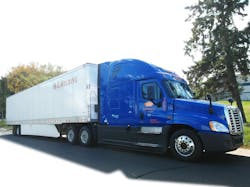Seventy-five years ago, Herbert Wolding was traveling around central Wisconsin making milk deliveries with his one-man trucking operation. Today, at 101 years of age, while no longer traveling the roads of Wisconsin, Wolding still drives to the office each day to keep tabs on the company that he founded, H.O. Wolding.
The family-owned Amherst, WI-based carrier has come a long way from those humble beginnings. H.O. Wolding is now a fleet of 350 tractors and about 1,000 trailers making local, regional and long-haul deliveries across the continental U.S. It’s a far cry from that initial one-truck operation, but not from the original ideals of what Herbert Wolding envisioned.
Providing first-class customer service is important to the company, but so are environmental concerns, safety and driver comfort—and the company factors all of those into its decisions when it comes to the fleet’s environmental footprint.
With a seven-year trade cycle for its tractors, it’s important for H.O. Wolding to spec its vehicles correctly. For years, local Freightliner dealer Truck Country of Rothschold, WI, has supplied those tractors. But it wasn’t until around 2007 that mpg began trending upward and that has only increased significantly for the fleet since it started incorporating the new Cascadia Evolution tractors, the company notes.
Solid first impression
According to a company representative, the Evolutions, generally spec’d with 10-speed Eaton Fuller manual transmissions, have been performing as advertised in terms of fuel economy. H.O. Wolding has also taken delivery of two Evolutions equipped with the new DT-12 automatic transmission for testing.
There have been mpg gains attributed to the downhill e-coast programming of the DT-12 transmissions, which shifts the transmission into neutral on downhill grades. According to the company, drivers have been pleased so far with the transmissions, noting the smooth operation and positive attributes such as the “skip shift” and creep mode features that make it easier for them to back into loading docks.
In addition, reporting of mpg performance data to drivers has allowed them to see how their driving behaviors impact fuel economy.
Overall, the fleet is a mix of Freightliner Columbias, Cascadias and now Evolutions. All the Cascadias are equipped with either Detroit Diesel D13 or D15 Series motors. Individual specs vary, though, as certain tractors, such as those operating in the Northeast regional fleet, feature lighter-weight specs for hauling heavier loads.
The company has been a SmartWay Transport Partner since 2004—the second fleet in Wisconsin to ever join, in fact—and now purchases only SmartWay-designated tractors and trailers. Optimization of engines and drivetrain combinations along with constant monitoring of engine idling through terrestrial and satellite technology have led to a 60% reduction in idling throughout the fleet. Idling has been reduced in part by the use of Thermo King’s TriPac APU and the new TriPac e, both of which provide battery-powered heating and air conditioning. These technologies have been met favorably by drivers, the company says.
New trailers purchased since 2010 have been equipped with trailer side skirts, SmartWay-approved low-rolling resistance tires, and tire inflation systems. The company has committed to retrofitting trailer skirts on previously purchased trailers going back to model-year 2005. Refrigerated trailers, which run between Wisconsin and the West Coast, have been retrofitted with trailer boat tails to improve aerodynamics.
As with any fuel-saving initiative, driver buy-in and feedback is important, and H.O. Wolding is no different. The company continually provides driver support and training and offers avenues for drivers to provide feedback. The ongoing training offers tips on increasing operational efficiency and keeping drivers up-to-date on the most recent advancements and information. This is all done through face-to-face training, online courses, and with Pro-Tread safety videos.
Time and place
H.O. Wolding has also seen fuel savings through its use of a fuel optimization program, installed in 2008, combined with PC*Miler practical trip routing. This package helps drivers make the best fuel purchasing decision based on several factors, including current fuel level in the truck, and current fuel prices.
Finally, proving that savings do come in many forms, H.O. Wolding practices environmental responsibility in many areas, including the shop, where it recycles both used oil and oil filters, and operates a technology recycling program. When possible, longer-distance employees are given the opportunity to work from home on a part-time basis, helping them reduce their own personal fuel costs.
And all of this has grown out of Herbert Wolding’s hard work and ideals—all of which are still practiced today in Amherst, WI.
